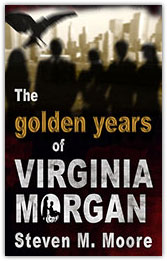Playing vs. watching…
I don’t like to watch baseball games—they’re just too slow—but I liked to play baseball. As a big, clumsy, six-foot-three kid, I didn’t qualify for JV basketball and didn’t even try out for varsity later on, but I still played a lot of basketball half-court games in our high school noon league. I didn’t go out for track, but I could beat my older brother in shotput, who did.
Reading and writing are like that in the sense that writing is more active than reading. In playing a sport, you have to be creative. Writing is playing the game; reading is watching it. Both playing and watching can enrich our lives, but I could hardly wait to progress from watching other authors play as far as books go. Being young and naïve, I decided early on that I could be just as good a storyteller as the authors I was reading. Two things stopped me: (1) I had to provide for my family (that’s hard to do as a writer, especially early in one’s writing career); and (2) there’s a lot that goes on between ideas for a story and a finished manuscript that requires practice, no matter how many skills a writer starts with.
Practice to improve your game is as important in writing as it is in sports. Skills have to be honed so the transitions from ideas to manuscripts become smooth and automatic. Although I often state that storytelling is what makes us human—sitting around a campfire with a mastodon steak sizzling on the spit and telling the story about the hunt is maybe how it all started (apologies to vegan and vegetarian readers, but our ancestors were omnivores)—but the road from ideas to finished manuscript isn’t an easy one today. Each novel is a new adventure, of course, and a writer needs to reset a bit when changing games or playing a new game, but experience counts.
I’m guessing the ladies in my reading audience probably object to these sports analogies, so let me discuss other events in my past. I was a 4-H club member—the San Joaquin Valley where I grew up is where agriculture reigns supreme—and one of my many 4-H projects (not the most time-consuming or most difficult) was to help my mother can that wonderful California fruit or turn it into jellies and jams. I never considered that to be sissy work—it’s work, to be sure, and was a reflection of how my mother helped the family survive the Great Depression and World War II scarcities, and how my father instilled in us a work ethic that focused on providing for the family, ours and others in time of need. There was always extra to give away to people, especially old-timers in the church congregation living on Social Security. Of course, there was an ulterior motive: I liked to eat the canned fruit and jams and jellies, and so did my father and brother.
Those who have done any of that know it’s all like sports: I practiced to improve my game. So it’s also just like writing. Orange marmalade and canned apricots (we had one of each tree in our backyard) are akin to sci-fi and mysteries—different, yes, in that the set of skills are different, but similar in the sense that those skills need to be honed through practice. I never received any trophies for my sports activities, and I haven’t won many writing contests, but my canned fruits, jellies, and jams won blue ribbons at the county and 4-H fairs.
Maybe I’m in the wrong business now. My excuse is that I no longer live in California. Here on the East Coast fruit is too expensive! But my observation remains a valid one: There are many activities in life where playing the game is often more interesting and rewarding than watching, but practicing and honing one’s skills is necessary to improve one’s game. With every word, paragraph, and chapter I write—indeed, with every novel—I’m creating but practicing as well…and enjoying every minute of it!
***
Comments are always welcome!

The Golden Years of Virginia Morgan. This is one of my “evergreen books,” a novel as exciting and current as the day it was published; it’s also a bridge between two series, “Detectives Chen & Castilblanco” and “Clones & Mutants.” A DHS agent looking toward retirement finds a lot of excitement as she uncovers a conspiracy and meets a new love. The conspiracy answers the following question: What will a future US government do with its old retirees who know too many secrets? The romance answers the question: Can a divorced woman heading for retirement find love in her golden years? DHS agent Ashley Scott is the main character. She had important supporting roles in the “Chen & Castilblanco” books, so I thought it was only fair to give her a starring role! Available in .mobi (Kindle) ebook format at Amazon and in all ebook formats at Smashwords and all its affiliated retailers (iBooks, B&N, Kobo, etc.) and lending and library services (Scribd, Overdrive, Baker & Taylor, Gardners, etc.)
Around the world and to the stars! In libris libertas!
